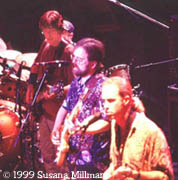|
Jeff: Well you know, Phil does run the show. Rob:
He was very clear about what he didn’t want. As far as
knowing what he did, he left it open-ended to see what would happen,
but there were specific things that he knew he didn’t want. Like
there were certain grooves that he didn't want - like for instance
Foolish Heart. He
said something like, "I don’t want to do it like the Dead
use to do it. I don’t want that back beat that Billy use to do.
I want something completely different. I want to go for this high
life kinda deal you know, kind of Caribbean sound."
Rob:
And their approach to Uncle John’s Band and other stuff..
PZ: So did that come easy to you guys or was it tough to keep every song different to the extent that Phil wanted it? Rob: I remember rehearsing Uncle John's Band for the first time with Phil. I’m used to playing with the Tricksters – doing things the way we do it – it does throw you for a loop at the very beginning, but you just take on the whole improvisational thing and go with it. Jeff: The lesson I had to learn was that he didn’t want someone to play like Jerry – he didn’t want another Jerry - so at first I played and quoted Jerry a little bit too much and he mentioned it to me. PZ:
So what did Phil do? Did he give you a little nod or something? Rob: Be yourself… Jeff: Yeah, be yourself, you don’t need to quote Jerry at all. You know, that’s not what we’re looking for. PZ:
Did you guys have any input in song selection?
Rob: No, Phil really knew what he wanted to do pretty much. Jeff: We made suggestions, but he really had it pretty much figured out already. Rob:
There were a lot of songs that I would have loved to have done
and found out through time that some of the songs PZ: I'm sure there were a few songs that you wanted to do with Phil that you didn’t get to. What comes to mind? Jeff: I e-mailed him a list while we had that week off between the rehearsals. I looked over our repertoire of Dead songs we do that he hadn’t done yet… PZ:
Yeah, because with The Zens, you guys do stuff like Easy Wind
and New Speedway - stuff the fans would just love to hear.
Jeff: Yeah, everything from much more obvious things like Deal or something like that to He Was A Friend of Mine or something like that…. Rob: Yeah, but He Was A Friend would be like one that he probably wouldn’t want to do. Jeff: Rob asked him about Sing Me Back Home… Rob: And he goes "I hate prison songs," (laughter) and he said, "You know what song I really hate? Folsom Prison Blues" which we do and love doing. (laughter) PZ: Right off the top of your head, what was one of your favorite songs you did with Phil?
Jeff: There were some moments at the Warfield shows where I stepped back and sort of took stock of what was happening… Like, "Wow…I’m playing Dark Star with Phil Lesh or Unbroken Chain." Rob: Yeah, ^Unbroken Chain was very cool! Jeff: Unbroken Chain was really cool and Phil was really psyched that I knew the intro so well. PZ: Oh yeah! From the point of that Unbroken from the first night to the third night when you guys opened with Brokedown Palace - typical Dead encore - were you guys making a statement? Jeff:
Well, you know what was interesting, Phil wrote out the setlists
especially to plan for the segues between them. You’ll notice
there’s almost no breaks between songs. It was almost all musical
bridges between the songs. So, the first night of course, we opened
with Jump
which was the big "you’re not ready for this folks are you?"
(laughter). The next night we opened with Milestones, a jazz tune,
so I’m thinking to myself, "What have we got left that’ll
throw people off the last night?" PZ: What did you guys think of the crowds reaction over the course of those Warfield shows? Was it nuts right from the start with the Jump?
Rob: I think it’s cool the way we did this last tour opening every night with a jam thing – which actually happened by accident the second night. We were just tuning up and I played something and before I knew it, everybody was playing something, and we were playing, and the house lights were still on and all of a sudden the house lights went off and we were in this jam that came from nowhere. After the show Phil said, "I want to start all of the shows like this" and he was even ready to abandon the whole setlist and just jam all night and tease every song and never play any of them. (laughter) He said that woulda been great! PZ: Are you serious? (laughs) Rob: Yeah. He said that would’ve been great! (laughs) PZ: Most of those opening jams were over twenty minutes. What was interesting was that there were several distinct themes to each jam. How did that go? Rob:
Well, we'd talk every night just before we were about to go on
stage and Phil would say, "Okay, what key are we gonna do
tonight?" and we would all make suggestions and agree on
a key. So every night was a different key. I don’t think we repeated
a key on the whole tour. Basically we just agreed to go with a
"whatever happens, happens" attitude. Molo had the power
to go into any groove he wanted and some nights Phil would start
a groove himself and some nights we just organically got to some
place, you know?
Rob: You need to have huge ears on that stage. Everybody that was up there at the Warfield - and on this tour - anything that happened, everyone was on it. So, if Phil decided to change the key in the middle of a jam, everybody was on it. Jeff: Yeah, you just knew it. Like we'd be playing in B minor and then it’s like "Oh Phil’s playing in G now," and then you just go there - and everybody would go there too. PZ: So it was very impromptu – none of these jams were structured at all then? Rob:
No never. We would never even talk about them. Phil would basically
say, "Okay, this is the setlist. Let’s pick a key to start
the jam in the beginning of the night and then we’re gonna go
from this song to this song..." Rob:
Right, some songs would be in drastically different keys, so we
would agree on, like, "When we come out of this we’re gonna
be in D minor - we’ve gotta get to G minor somehow" or some
other key, so maybe half way through it, Phil would signal a change
in key and we'd go there. He had all these different signals
that he would use on stage - like conducting. (laughter) There
was just something about it that was very cool. Like everybody
play (signaling a swirl above his head) and wind it down
(signaling with a swirl with arm down)
This
would be like (signaling with two fingers horizontal at chest
level) stay on this key now, let’s stay this way. He had
a thing to tell Molo to speed up or slow down too. He was like
a conductor – really cool!
Rob: Well, we had people on stage who were very adept to doing that and once you throw a horn in there you’re already going there, unless it’s someone like Clarence Clemons who is not a jazz player - he's more of an R&B player. Bobby can really jam though and it just went naturally. PZ: Did you know at the time that you’d be doing the Dylan leg of the tour as well? Rob: Yes, I was way psyched, but a little disappointed when we found out that we wouldn’t get to play at the Denver shows. PZ: You played some Dylan songs out at the Warfield… Rob: Phil loves Dylan. We didn’t do any Dylan stuff for the Dylan leg... Jeff: Well, you have Bob Dylan out there... Rob: I know, but you figure maybe if we did put one in the set and he knew it, maybe he would have come out and played with us. PZ: Did you think you’d get to play with Dylan? Rob: We were hoping that he’d come out and play with us. There was no set thing with them though. Jeff: Can Bobby come out and play?! (laughs all around) Rob: The thing was he and Phil talked, and one night we were eating dinner and Dylan’s bass player approached Phil and said "Listen, Bob would like you to sit in with us tonight." Phil was just ecstatic and he went out there and played a couple of tunes and that happened a few times. Then the last night, all those guys got to play but RocketCargo came to pick up my stuff right after we finished playing. They packed the organ up in the semi- and I’m standing there like, "Oh, there’s no keyboard - oh man." They were all up there playing and I’m sitting out in the audience like "shit" but it was cool. Dylan really got off on Warren a lot. You should’ve seen him! He was all over him like smiling and rocking and Warren’s just playing slide and kickin' ass. (laughs) PZ:
It’s too bad that didn't happen a bit more. You know fans were
hoping for a Phil and Bob duet? Rob: Bob came out and saw us play a lot of times on tour. He’d put on this gray sweatshirt with this big hood – nobody knew who he was - and he would stand on the side of the stage for a while and then he’d go out, right through the audience – right to the soundboard and nobody knew who he was. He had this big, huge guy who was his bodyguard, who would follow him. One night he lost Bob and he was all panicking. (laughs) That was funny. PZ: I can just imagine some guy just tapping him, "Hey man you’re in my way" (laughs) Jeff: What do you mean you lost Bob? (lots of laughter) You can’t lose Bob! PZ: What was it like for you playing in all those big venues? Rob: The first night it was just a mind-blower. During the sound check I just couldn’t believe it. Jeff: Well you’ve played large venues before… Rob:
Yeah, I’ve done it before with Freddie Jackson - I played some
pretty big places. But this is way different because I was really
in the forefront. With Freddie Jackson I was just a background
keyboard player. So the first night the place was packed and they
went nuts, I was just like "Ahhhhhhhhh - Wow!" but after
about thirty seconds you might as well be playing in your own
living room, you know? Even
at Continental Arena you’re just like "Wow, this is great,"
(PZ: yeah like 22,000) but once the music starts you’re
on the edge of your seat and basically holding on by the seat
of your pants because you don’t know what the fuck’s gonna happen
next and you forget about the audience. |
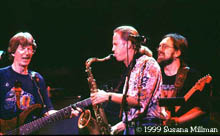
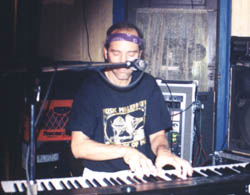 were
just too painful for him to do. A real good example is Stella
Blue, which he was doing an instrumental
version of, and I asked him at the second show of this last tour,
"I could sing Stella Blue. I’d love to do it if you want
to." and he just looked at me and said "you know, I’m
gonna have to think about that one because it’s really hard for
me." Then I talked to Cutler about it and he said the same
thing. He said, "When Phil first decided to do this, they
sat down and talked about song selection and they all said there
are certain songs you just cannot do."
were
just too painful for him to do. A real good example is Stella
Blue, which he was doing an instrumental
version of, and I asked him at the second show of this last tour,
"I could sing Stella Blue. I’d love to do it if you want
to." and he just looked at me and said "you know, I’m
gonna have to think about that one because it’s really hard for
me." Then I talked to Cutler about it and he said the same
thing. He said, "When Phil first decided to do this, they
sat down and talked about song selection and they all said there
are certain songs you just cannot do."
 Rob:
Eyes was cool. I loved it in Maine - after the opening jam, we
went into
Rob:
Eyes was cool. I loved it in Maine - after the opening jam, we
went into 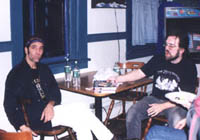 Jeff:
Well, I think people definitely learned to expect the unexpected,
which was always a Grateful Dead thing. That’s why people kept
going back to dead shows because you'd never really know
what was going to happen.
Jeff:
Well, I think people definitely learned to expect the unexpected,
which was always a Grateful Dead thing. That’s why people kept
going back to dead shows because you'd never really know
what was going to happen. 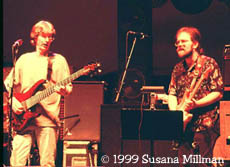
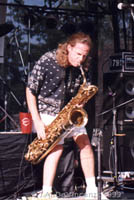 PZ:
At the Warfield, with Bobby Strickland also, you’ve got all these
musicians all with potential leads - how did you guys manage that?
PZ:
At the Warfield, with Bobby Strickland also, you’ve got all these
musicians all with potential leads - how did you guys manage that?
